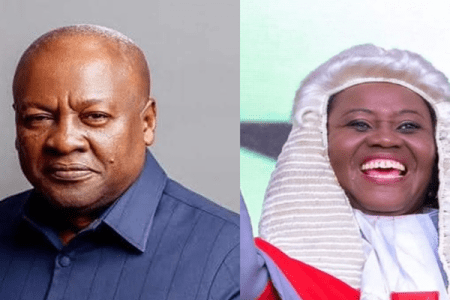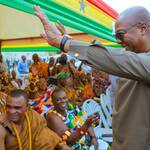President John Dramani Mahama’s decision to suspend Chief Justice Gertrude Torkornoo marked an unprecedented moment in Ghana’s judicial history.
Acting on the advice of the Council of State, and invoking Article 146(10) of the 1992 Constitution, the President issued a warrant that removed the nation’s highest judicial officer from her duties with immediate effect.
A statement issued by Felix Kwakye Ofosu, Minister for Government Communications and Spokesperson for the President said the suspension is to remain in force pending the outcome of a formal inquiry into serious allegations that have cast a shadow over the Chief Justice’s tenure.
Simultaneously, President Mahama determined, pursuant to Article 146(6) of the Constitution, that a prima facie case exists against Justice Torkornoo based on three petitions lodged since her elevation to the bench.
To investigate these charges, he appointed a five‑member committee, chaired by veteran public servant Gabriel Scott Pwamang.
Its members include Supreme Court Justice Samuel Kwame Adibu‑Asiedu; Daniel Yaw Domelevo, the former Auditor‑General, Major Flora Bazwaanura Dalugo of the Ghana Armed Forces and Professor James Sefah Dzisah Associate Professor of the University of Ghana.
Alleged misappropriation of funds in procurement
The first petition alleges that during her time as a Court of Appeal judge, Justice Torkornoo directed the court’s administrative arm to award printing and stationery contracts to companies linked to her personal associates, bypassing competitive tender.
Petitioners claim that over the course of two fiscal years, contracts were steered towards these firms, in contravention of both the Public Procurement Act and the Judicial Service purchasing regulations.
According to those who brought the complaint, this practice amounted to a conflict of interest and deprived the state of value for money, raising troubling questions about accountability at the highest levels of the judiciary.
Alleged questionable recusal and case management
A second petition, filed by a small coalition of private practitioners, accuses Justice Torkornoo of questionable recusal and case‑management practices.
According to their submission, she repeatedly sat on interlocutory matters in which one of the parties was represented by an attorney who had previously clerked for her, or where the dispute involved institutions she once advised.
This, they argue, created a perception of bias. They further note that in at least two such cases, interlocutory rulings under her direction were overturned on appeal—a development that, in their view, eroded public confidence in the impartial administration of justice.
Alleged irregularities in the promotion exercise
The third petition challenges the integrity of the promotion exercise that elevated Justice Torkornoo from the Court of Appeal to the office of Chief Justice.
A network of magistrates and lower‑court judges contend that the Judicial Council’s selection committee, influenced by her professed “reform‑agenda commitments,” departed from the statutory short‑listing criteria of seniority, performance evaluations, and disciplinary records.
They maintain that the process was skewed toward a predetermined outcome, in breach of the Judicial Service Regulations, and that this undermined the meritocratic principles meant to govern promotions within the judiciary.
Public funds and private travel
Compounding these formal petitions are reports alleging that public funds were used to purchase air tickets for the Chief Justice’s spouse and children.
The Judicial Service budget—financed by public revenue—was charged for international travel ostensibly described as “courtesy visits” or “official engagements.”
Critics argue that the Judicial Service’s own regulations permit subsidized travel only for a judicial officer’s official duties, and, under exceptional hardship circumstances, for dependents—conditions they say were not met.
Calls for an independent audit of the transactions and full disclosure of all related records have grown louder in recent days.
As the Pwamang Committee begins its work, it faces the daunting task of sifting through complex procurement files, travel logs, and case records, while hearing testimony from petitioners, court administrators, and other key witnesses.
The outcome of this inquiry will determine whether Chief Justice Torkornoo returns to her post or faces further disciplinary or removal proceedings.
For now, an Acting Chief Justice presides over the Supreme Court, and the nation watches closely.
- ECOWAS advocates reforms to improve intra-regional trade - 23 April 2025
- Karim Zito replaces Ogum as new interim Kotoko coach - 23 April 2025
- Ghana to serve as bridge for West African unity – Mahama - 23 April 2025

